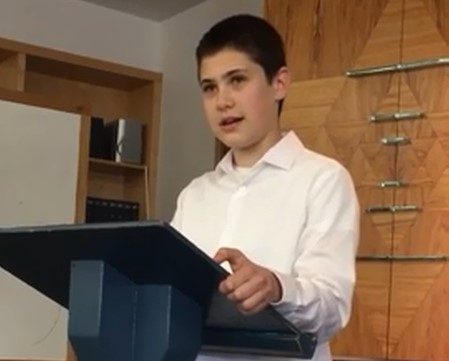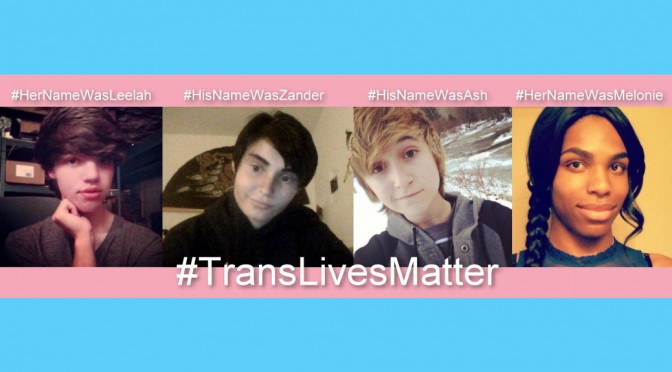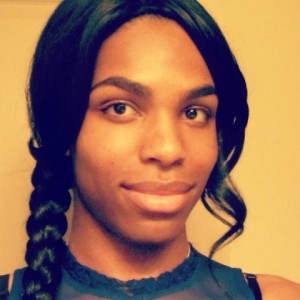Tom Sosnik comes out as Trans citing Leelah Alcorn as inspiration

An apparently confident young 13yo Jewish teen living in Oakland, California, has come out as trans with the full support of his sister and parents. Tom Sosnik comes across as mature, self-assured and brave, but in no doubt of the hard path ahead. He cites Leelah Alcorn at the beginning and end of his coming out speech and both, thanks, and calls for the support of, his peers and community.
His YouTube video, published 16 March 2015, comes with the following statement by him:
This is how I came out to my community as trans.
Please share my story and my message with your loved ones.
To all those struggling to embrace their true and authentic gender or sexuality, I want you to know that if no one else accepts you, I always will. Rest in power, Leelah.
Full text transcript of Tom Sosnik’s coming out video
“On December 28, 2104, Leelah Alcorn a 17 year old trans woman committed suicide because her family didn’t accept her. This made me want to act on a subject that has been bothering me for quite a long time.
All of sixth grade I struggled with my gender identity and I’m now embracing my truth. For a while, I dismissed the fact that I hated my body, I pretended to be content with what I was assigned until at a certain point I broke. I went through a series of horrible breakdowns and I would stand under the water in the shower crying. I knew I wasn’t happy but it didn’t seem fair to me that everyone else around me was. They didn’t spend all their time thinking about how much they hated being categorised as a woman. I didn’t share that same feeling, in fact, I felt the opposite.

For some of you, this may come as a shock and for others, well you knew or thought I was transgender, well here’s your reassurance – I am no longer Mia, I never really was and now I finally stand before you in my true and authentic gender identity, as Tom. I stand before you as a 13 year old boy.
I understand that this will be a difficult adjustment but I hope and trust that you will treat me with respect and thoughtfulness. So for those of you who are having trouble that is completely understandable. You have known me as a girl for over a year and it is hard to understand that I never was that girl. I want to tell you as a I consider you all my friends, well most of you – no I’m kidding. In my heart I am still the same person, whether you like that person or not, it’s me. So here I am, no longer Mia Sosnik, a 13 year old girl, that you thought you knew, but Tom.
I imagine that some of you will have questions and I am open to answering them at any time they come to you. I trust that you are all mature enough to understand which questions are inappropriate, disrespectful or hurtful. Please feel free to ask me because after all I know the most about my transition. Please talk about this with your parents and your family but I ask of you really not to talk about it with your friends, it’s not – gossip worthy.
If there’s something you want to say I’m happy to talk with you and I really hope that you all will support my decision to embark on a harder route in life as the boy I truly am. Any form of support I receive with much gratitude and I hope that everyone can really support me because you guys are like my second family. And if you support me, I will feel like the luckiest boy in the world. Thank you for letting me share my story.
I want to just tie it back to what I said at the beginning. After reading Leelah’s suicide letter I came to really appreciate the support I have in my family in my community that she never got. Thank you all for making me feel safe enough to openly be myself.”
Risk of Copycat Suicides
The positive references to Leelah Alcorn are all the more uplifting given the spate of US trans teens suicides recently, and the lack of recognition even in death by many of their families. Overnight, it was desvestating to hear of yet another suicide as 18 year old Blake Brockington took his life. He was the first Charlotte, NC trans homecoming king last year. This, only weeks after Ash Haffner, another Charlotte trans man ended his life.
Furthermore, some have argued that the sharing of Leelah Alcorn’s suicide letter would inspire copycat suicides, rather than in the case of Tom Sosnik, an inspired coming out, in part, because of her.
Family Support
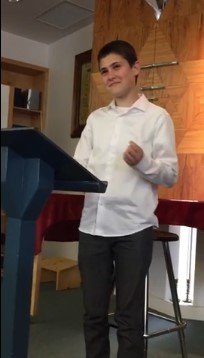
Both of Tom’s sisters have been “meaningful members of his support system“, and one of them, Gil Sosnik, shared his story and video on facebook:
Last week, my 13 year old brother came out as trans to his school and community in a really moving naming ceremony and we were able to capture it on camera. Seeing how much his words have inspired and touched the family and friends in his own network, Tom began to see that there was something about his speech that was universal and humanizing, something that could empower trans* and otherwise gender nonconforming folks while also conjuring empathy and understanding among allies. Watch and share if you are moved by his story.
It has been clearly demonstrated that family support has a huge impact on the mental wellbeing of transgender youth and according to a 2012 Canadian report, can lead to a:
“93% reduction in reported suicide attempts for youth who indicated their parents were strongly supportive of their gender identity and expression”
Without that support, some 57% of young trans people attempted suicide, even higher than the averaged-out figure for trans of all ages and domestic backgrounds. (See more on suicide risks)
Religious Contrast
Another LGBT suicide has recently been put down to religious non-acceptance in the harrowing story of gay repression and rejection in the life of a successful Muslim Doctor in the UK.
More positively, Tom’s family and religious background is in complete contrast to the religious home life of Leelah Alcorn which saw her sent to Christian therapists and undergo conversion therapy to try and stop her being trans. A path which was no doubt a contributing factor to her suicide and is categorically dismissed as psychologically sound or helpful by the APA.
Reparative Conversion Therapy
Reparative or Conversion Therapy seeks to turn someone from their innate sexuality or gender identity by positively encouraged, aka forced, heterosexual and birth sex gender “appropriate” roles. Of course the concept of appropriate comes from stereotypical concepts of socio-familial and sometimes all-out religious traditional understandings. This kind of aversion therapy, whether of LGB or Trans people, is more likely to increase suicide risk than prevent it. The APA argues that:
“reparative therapy poses a great risk, including increasing the likelihood or severity of depression, anxiety and self-destructive behavior for those undergoing therapy.”
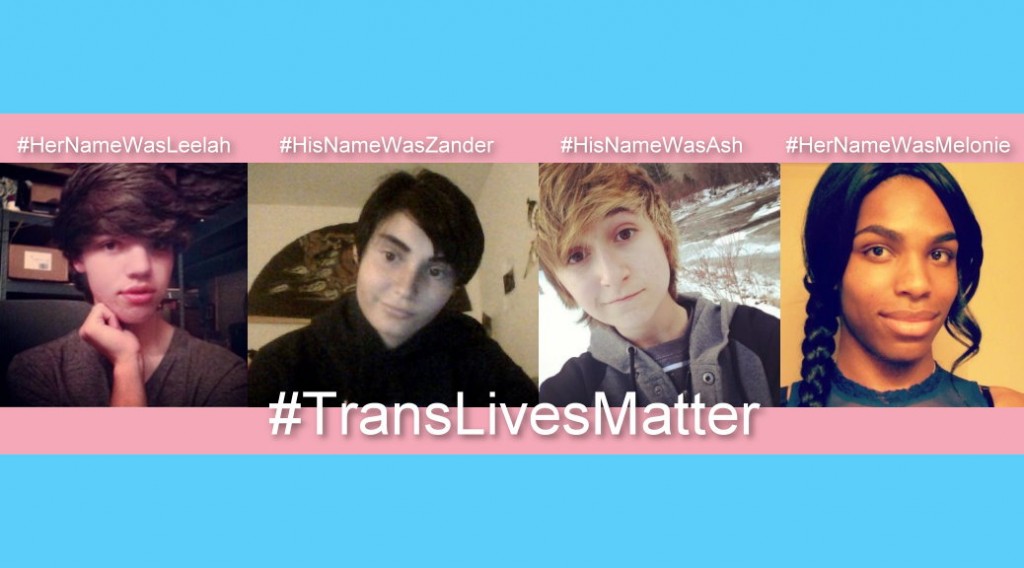
Dr Kenneth Zucker
Dr. Ken Zucker is Psychologist-in-Chief and Head of the Gender Identity Service in the Child, Youth, and Family Program at CAMH, Ontario. The American psychologist and sexologist, and GIC head at Toronto’s Centre for Addiction and Mental Health, is also on the APA’s DSM-V committee. Just last week CAMH suspended all trans admissions and treatments by Zucker and has put the whole programme under review.
“The APA, responding to criticisms by LGBT activists, point out that Zucker does not advocate reparative therapy for teens and adults, not for gays and lesbians at any age, but only for the trans community.”
Well that’s ok then – “only for the trans”! This is 2015 and being trans is still considered a mental illness, a mental struggle – yes, but it is not something that is aided by disparaged and unethical reparative therapy and pathologising treatment.
How Trans Support should be done

Tom’s own family is Jewish and seems to have positively supported his coming out, posting nothing but proud affirmations on Facebook whereas Leelah was banned from using social media and cut off from her friends and support network.
Tom Sosnik, his family and community, are an example of how coming out as trans, and/or LGB, should be handled – with bravery, acceptance, and support. He and his family embody the “fixing of society” that Leelah Alcorn called for.
